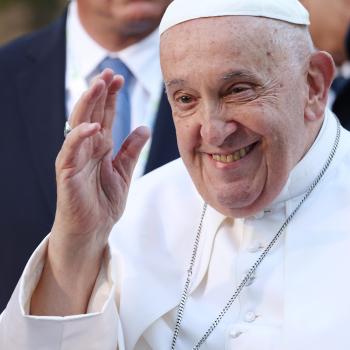As you think about the Church—our church, the Episcopal Church USA, especially, but maybe the whole Church catholic—would you agree with Andy, or do you see something else as the greatest problem facing us?
GR: Well, I certainly do not disagree with that! Bishop Andy is smarter than I will ever be, but it seems to me that some of our brokenness is due to the luxury we live in. Even with these scary economic times, the reality is that we still live in a consumeristic, saturated world where most of our needs are clearly met, and beyond that we have discretionary income to indulge still other appetites. All of that provides a filter, a barrier to recognizing the fragility of life. I believe some of our brokenness with the Global South for instance, is that, we can no longer relate to one another because of our luxury. So, while I agree with Bishop Andy, and with the Pope, who, a few years ago said roughly the same thing, that no one would want to come to a church that is angry and divided, it is not brokenness per se, but what brokenness we spend our energy on—which is mostly our own corporate brokenness.
I think many who finally step in our doors step in because of their brokenness, looking for some community to recognize that, not avoid it, provide some ways to help with it, and teach them how to pray in the midst of it. Instead, sadly, they often find people who claim to know something a bit more and above them, and a church that sometimes majors in niceness, rather than reality. I sense the younger generations looking for a fun place, yes, energy, good conversation, deep reflection about serious issues, but also a place where diversity of thought is honored and where they learn the life skills to keep that greater conversation going in their lives. In the midst of all of that they know the power of mystery, and don't necessarily want a place of answers, but more a place of reflection, meditation, silence. True engagement, instead of the veneer of much of our religion, would be the more subtle but short way of saying it.
My favorite metaphor for church is a base camp. You do not go to the base camp to stay. It is not the destination. It is a rest stop for nourishment, healing, binding up wounds, and regaining strength for the journey to continue forward. I really think living this out rather than focusing on our own internal squabbles and brokenness will make our churches centers of living and salvation once again.
GG: Greg, I love this idea of church as a staging area getting us ready for what's next. I talk—as I'm sure you do—with lots of churches about the necessity of turning outward instead of inward, which is our tendency when we're arguing with each other or caretaking the institution instead of listening to the message of love and hope that supposedly is the reason for the institution. As true on the national level, I guess as the local. But what about the international level? A question I often get from more Protestant people of faith has to do with how the Episcopal Church operates. What is our relationship to the worldwide Anglican Communion? How much control or influence does the Archbishop of Canterbury exert over us?
As you know, I spend a lot of time in England, and worship often in Church of England parishes, so I have great fondness for Anglicanism, but I too struggle to know how to relate to it. Our friend Rowan Williams has had his hands full trying to keep an amorphous international collection of Christians together, and we Americans have not made his job easier by moving forward on decisions we believed to be theologically and pastorally sound and necessary within our context. Could you help me—and others—understand our present relationship to the Anglican Communion? And what do you think that relationship ought to be moving forward?
GR: Good questions. We are related to the rest of the 39 Provinces of the Anglican Communion through "communion" which is a unique and somewhat elusive reality sometimes. There is not a constitution and canon for this body. It operates out of mutual love, affection, and support, which can make it unwieldy and a bit frustrating to the orderly mind. But, in the end, it is based on Christian community, mutual affection, the real struggles of what it means to try to hang together through differences. Rowan Williams, the Archbishop of Canterbury, is the spiritual head of the Anglican Communion, while not operating like a Pope. He has jurisdiction in his see of Canterbury, but he is the "first among equals." He spiritually leads without canonically leading. Some of this has been in dispute lately as to how much power he should have, and should he move from a more spiritual leader to a more Pope-like leader. This bit of struggle continues.
Because of its uniqueness among the major denominations, I very much cherish and honor our Anglican roots and connection. I find it to be very important if for no other reason then that it models a different way to be connected in our world of faith. Of course, I think there are many more important reasons, not the least of which is the added abilities we have at ministry because of the numbers and the connections. Staying at the table in the face of disagreements is always the struggle but also the model we should offer the world. I think this makes the connection important and worth working very hard to sustain.





